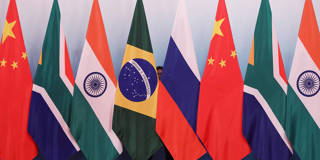The annual BRICS summit is an ideal occasion for political leaders like Vladimir Putin to promote a vision of a world that the United States does not lead. But each year also brings further confirmation that the grouping serves no real purpose beyond generating symbolic gestures and lofty rhetoric.
LONDON – This month, Russian President Vladimir Putin will host the 2024 BRICS (Brazil, Russia, India, China, and South Africa) summit. It will be the first annual meeting to include the four new members – Egypt, Ethiopia, Iran, and the United Arab Emirates – that joined last year, and many other countries also reportedly will participate. But what will come of it?

LONDON – This month, Russian President Vladimir Putin will host the 2024 BRICS (Brazil, Russia, India, China, and South Africa) summit. It will be the first annual meeting to include the four new members – Egypt, Ethiopia, Iran, and the United Arab Emirates – that joined last year, and many other countries also reportedly will participate. But what will come of it?